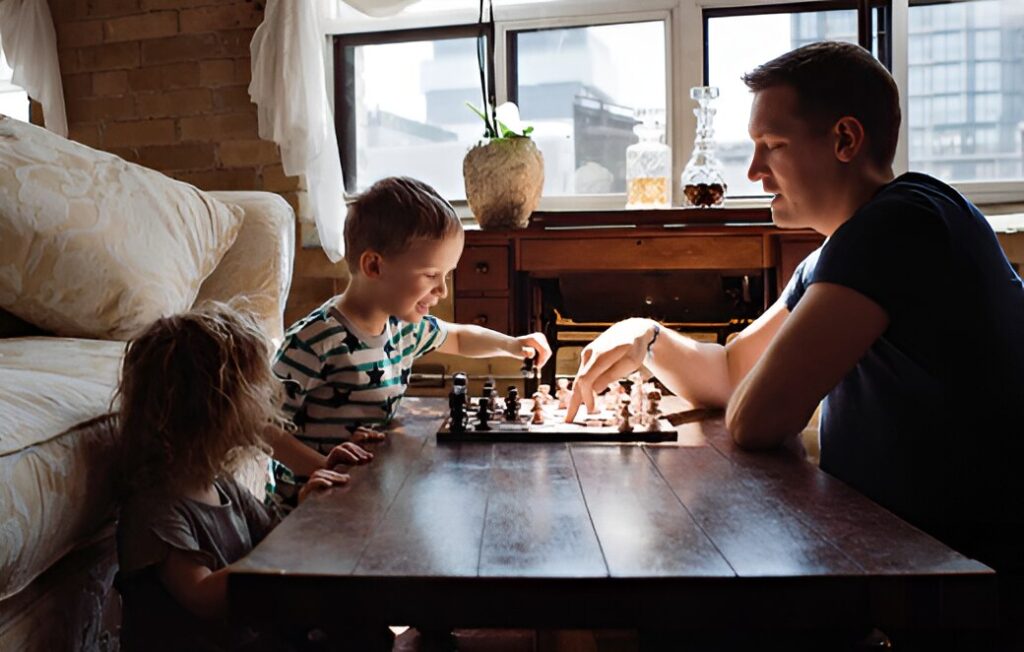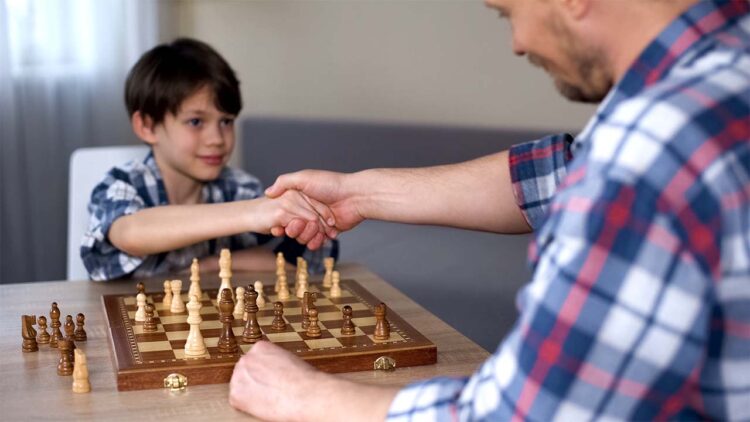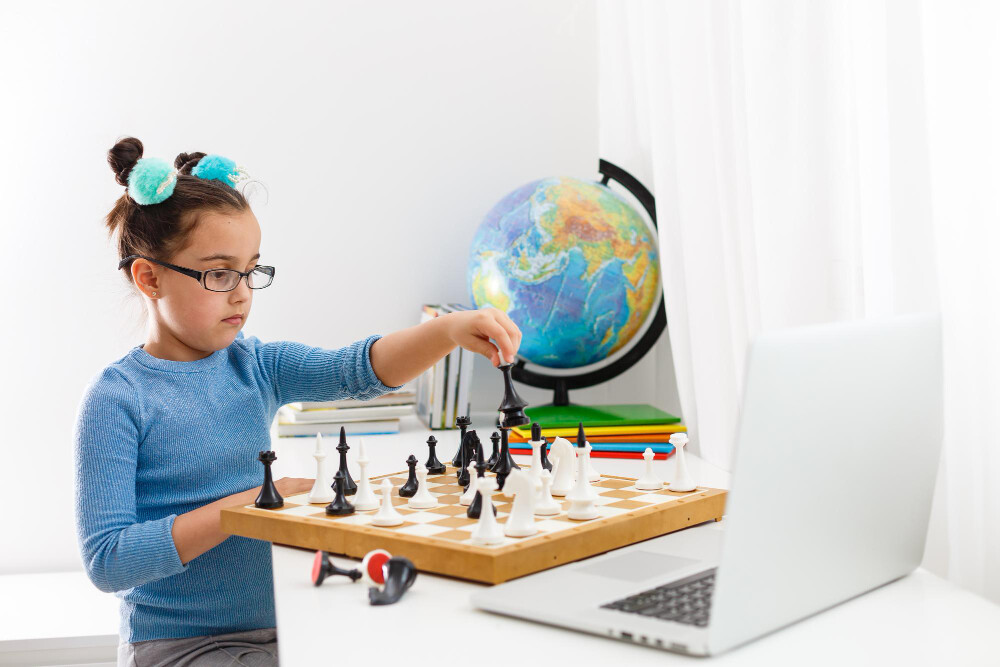Chess is a timeless game, often referred to as a “mental workout.” But beyond being a competitive game, chess serves as a powerful educational tool for children. One of the most valuable skills kids can learn from chess is how to break down complex problems step by step. When children play chess, they learn to think ahead, plan, and approach challenges in a structured way. These problem-solving skills don’t just help them on the chessboard—they translate to academic success and real-life situations.
Teaching Kids to Approach Challenges Step by Step
One of the reasons why chess is so effective in teaching problem-solving is that it requires players to think ahead. The very nature of the game forces players to break down their strategies into smaller, manageable steps.
When kids play chess, they’re faced with complex situations that may seem overwhelming at first. But as they learn the game, they start to realize that no problem is too big if you break it down.
Understanding the Chessboard: A Small Universe of Possibilities
For many kids, chess can seem like a daunting game at first. There are 64 squares and 32 pieces to consider.
Yet, as they learn the basic rules and the value of each piece, they start to make sense of the board. Teaching kids to see the chessboard as a series of smaller problems—each move requiring its own analysis—helps them develop the ability to tackle larger challenges in a step-by-step manner.
For example, a child might begin by focusing on protecting their king or trying to control the center of the board.
Instead of getting overwhelmed by the entire game, they break it down into smaller, manageable tasks. This is the essence of problem-solving: approaching a large, complicated situation one step at a time.
Evaluating Every Move
In chess, every move has consequences. This is where critical thinking comes into play. Kids must evaluate the potential outcomes of each move before they make it.
Is the move safe? Does it improve their position? Could it lead to an attack on their king?
This teaches children to think before they act—a valuable lesson that applies to life as much as it does to chess. Instead of rushing into a decision, chess players learn to pause, evaluate their options, and choose the best course of action.
Over time, this habit becomes second nature, helping kids become better problem solvers both on and off the board.
Planning Ahead: Thinking Beyond the Next Move
One of the key lessons chess teaches children is the importance of thinking ahead. In chess, success isn’t about just making one good move. It’s about making a series of connected moves that all work toward a larger goal.
Kids learn that each move has to fit into a bigger plan. This helps them understand that solving problems, whether in chess or in life, often requires thinking several steps ahead.
Connecting Moves to a Bigger Plan
When a child plays chess, they are constantly thinking about how each move influences the next. Should they develop their pieces, attack, or defend?
Should they move their knight or castle their king? Each decision they make must connect to an overall plan.
In life, problems are rarely solved in one step.
Chess teaches kids that solving complex issues often involves several smaller decisions. By playing chess, children develop the skill of creating a plan and then following it through while adjusting to new challenges along the way.
Adapting to Changes
One of the most valuable problem-solving lessons chess teaches is flexibility. No matter how well a child plans, their opponent may make an unexpected move that disrupts everything.
This teaches kids how to adapt. Instead of sticking rigidly to their original plan, they learn to adjust to new information and come up with alternative solutions.
In real life, this adaptability is essential. Life is full of surprises, and being able to adjust plans on the go is a crucial skill.
Chess trains children to expect the unexpected and teaches them how to quickly shift their thinking to solve new problems.
Learning from Mistakes
Mistakes in chess are inevitable. Everyone makes them, even the best players. But the key is how kids handle their mistakes.
Chess encourages a mindset of learning from failure, rather than being discouraged by it. When children lose a game or make a bad move, they can analyze what went wrong and learn how to avoid similar mistakes in the future.
Reflecting on What Went Wrong
In chess, after a game ends, many players go back and review their moves. This process of reflection is crucial for learning. By looking at what worked and what didn’t, kids start to see patterns.
They understand why certain moves led to success while others led to failure.
This reflective habit becomes part of their problem-solving toolkit. When faced with a problem in school or in life, they’re more likely to step back, evaluate what went wrong, and think about how they can approach the situation differently next time.
Chess teaches children that every mistake is a chance to improve.
Breaking Down Complex Problems

One of the greatest strengths of chess is that it simplifies complexity.
A chess game might seem overwhelming, with countless possible moves and outcomes. But when kids learn to break down the game into smaller tasks—developing pieces, protecting the king, controlling the center—they can handle the complexity one step at a time.
Focusing on Immediate Challenges
In chess, players often face positions that look complicated. But instead of trying to solve everything at once, kids are taught to focus on immediate challenges. Is their knight under attack?
Should they move a pawn to control a key square? By focusing on one problem at a time, children develop the ability to tackle even the most complex situations with a clear mind.
This same approach is incredibly useful in life. Large problems can feel overwhelming, but when broken down into smaller tasks, they become much more manageable.
Chess teaches kids to prioritize, to deal with one issue at a time, and to gradually work toward solving the bigger problem.
Step-by-Step Problem-Solving
Chess naturally encourages a step-by-step approach to problem-solving. Instead of rushing into a move, players think carefully about what needs to be done first.
Should they focus on defense or begin an attack? By thinking in stages, children learn that solving complex problems requires methodical thinking.
This skill translates directly to academic and real-life problem-solving.
Whether they’re working on a math problem or trying to resolve a disagreement, kids who play chess are more likely to take things step by step, making them more effective at finding solutions.
Developing Patience and Focus
Chess teaches patience. Every game requires careful planning and waiting for the right moment to act. Kids learn that success doesn’t come from rushing, but from being patient and focused.
These qualities are essential for solving problems, especially ones that require time and deep thinking.
Concentration for Long-Term Success
Chess games can last for hours, and staying focused for that long can be challenging, especially for children. But as they play more, kids learn to sustain their concentration.
They understand that staying focused on their plan, even when the game is slow or difficult, is key to winning.
This ability to focus for long periods is crucial in school and life.
Chess teaches kids that focus and persistence are the keys to overcoming challenges, whether they’re solving a tricky puzzle, writing an essay, or handling a tough situation at home.
Encouraging Logical Thinking
Chess is a game of logic. Every move is connected to a strategy, and each decision must make sense in the context of the overall game. By consistently practicing logical thinking, kids develop the ability to analyze problems and come up with practical solutions.
Cause and Effect
In chess, every move has consequences. If a child moves a piece, it opens up new possibilities, both good and bad.
Understanding this cause-and-effect relationship is crucial for making good decisions on the board. This teaches kids to think logically about their actions and predict possible outcomes.

This skill is useful in real life too. Whether they’re deciding how to approach a homework problem or figuring out the best way to solve a disagreement with a friend, children who play chess are better at considering how their actions will impact the situation.
Evaluating Options
In chess, there are always multiple options for every move. Children learn to evaluate which option is the best, based on the situation at hand. Should they attack or defend?
Should they sacrifice a piece for a better position? This constant evaluation of options builds strong decision-making skills.
In everyday problem-solving, this ability to weigh options helps kids make smarter choices.
Whether they’re deciding how to spend their time, figuring out how to approach a problem at school, or resolving an issue with a friend, chess helps them think through all their possibilities before making a decision.
Building Confidence Through Success
Every chess victory builds confidence. When kids solve a problem on the chessboard and see their strategy pay off, they feel a sense of accomplishment.
This boosts their confidence, not just in chess but in their overall ability to solve problems.
Confidence in Decision-Making
One of the most rewarding aspects of chess is that it teaches kids to trust their decisions.
Each move they make is a choice they own. As they play more and see their decisions lead to success, they grow more confident in their ability to solve problems on their own. This confidence carries over to school and everyday life.
Children who play chess become more comfortable making decisions, both big and small.
They understand that even if they make a mistake, it’s part of the learning process, and they can always improve with practice.
Chess Teaches Patience and Discipline

One of the most important lessons children learn from chess is that not everything can be solved quickly. Success in chess often requires patience, as winning strategies unfold slowly.
Children learn to stay disciplined, carefully considering their moves rather than acting impulsively.
Waiting for the Right Opportunity
In chess, rushing into an attack or making a hasty move can lead to mistakes. Kids learn that sometimes it’s better to wait for the right opportunity.
This teaches them the value of patience—an important skill when solving real-life problems, where the best solution may not always be the quickest one.
For example, whether it’s waiting to gather enough information before making a decision or taking the time to think through a complex math problem, chess helps children understand that patience often leads to better outcomes.
Building Self-Discipline
Chess also helps build self-discipline. Children learn that they can’t always act on their first instinct. They need to think ahead, plan their moves, and wait for the right time to act.
This discipline helps them focus better in school and other areas of life where patience and thoughtfulness are necessary for success.
Chess Helps Kids Handle Pressure
Chess can be an intense game, especially during tight matches where one mistake could change everything. Playing chess helps kids manage pressure and perform well under stress.
This is a skill that’s incredibly valuable, not just in games but in real-life situations where challenges can be overwhelming.
Staying Calm Under Pressure
When playing chess, kids are often faced with difficult situations.
Their opponent may be pressing hard with an attack, and they may feel like they’re losing. But chess teaches them to stay calm and not let pressure affect their decision-making. Instead of panicking, they learn to take a deep breath and think clearly about their options.
This ability to stay calm under pressure is useful in many areas of life, from taking tests to dealing with unexpected challenges.
Chess teaches kids that even in tough situations, keeping a clear mind and thinking through problems logically can lead to success.
Learning to Overcome Setbacks
In chess, losing a piece or falling into a difficult position doesn’t mean the game is over. Kids learn to recover from setbacks and find new ways to fight back.
This resilience is essential for problem-solving in real life, where things don’t always go as planned. Chess helps kids develop the mindset that even when things are tough, there’s always a way forward if they stay focused and persistent.
Chess Encourages Analytical Thinking

Chess is all about analyzing the current situation on the board and figuring out the best move based on what’s happening. Kids who play chess regularly develop strong analytical skills, as they’re constantly required to assess their position, weigh their options, and predict their opponent’s next move.
Breaking Down Problems Piece by Piece
In chess, players analyze their position by focusing on individual pieces, how they interact with each other, and what their opponent might be planning.
Kids learn to break down complicated situations into smaller, easier-to-handle parts, which is key to solving any complex problem.
This analytical thinking transfers into schoolwork, where children need to break down large assignments into smaller, more manageable tasks. Whether it’s solving math equations, writing essays, or tackling science projects, chess teaches kids to approach challenges in a structured, step-by-step way.
Learning to Predict Outcomes
A key part of chess is thinking ahead. Kids quickly learn that it’s not just about their next move but about predicting how their opponent will respond.
This kind of forward-thinking helps children not only on the chessboard but also in their daily lives. They develop the habit of anticipating outcomes before taking action, making them more thoughtful and careful decision-makers.
In real-life problem-solving, this skill is invaluable. Whether they’re deciding how to approach a homework problem or figuring out how to resolve a conflict with a friend, the ability to predict the likely outcomes of different actions helps children choose the best path forward.
Chess Enhances Concentration and Focus
Playing chess demands total concentration. Even a single lapse in focus can lead to a missed opportunity or a serious mistake.
As kids play more chess, they develop the ability to concentrate deeply for long periods, a skill that greatly benefits them in academic and personal settings.
Blocking Out Distractions
When playing chess, kids learn to focus on the board and block out distractions. This ability to concentrate on the task at hand helps them in school when they need to focus on assignments, tests, or projects without being distracted by their surroundings.
Chess strengthens this focus, making kids better able to maintain their attention in other areas of life.
Building Mental Stamina
Chess games can take time. Sometimes, players have to stay focused for long stretches, thinking carefully through every move. This builds mental stamina and the ability to stay engaged with a task until it’s complete.
Whether it’s studying for an exam or working on a long-term project, the focus and mental endurance developed through chess help kids stay on task and push through to the end.
Chess is a Lifelong Skill
Chess is a game kids can grow with. As they develop their skills, they also deepen their problem-solving abilities.
The lessons learned through chess—strategic thinking, patience, and logical analysis—will stay with them, benefiting them in school and life well into adulthood.
Chess Teaches Resilience
Mistakes and losses in chess teach kids how to bounce back. Instead of seeing failure as the end, they learn to treat it as a chance to grow. This resilience is vital in life, where setbacks are part of any learning journey.
Chess Builds Confidence
Every chess game, whether a win or loss, strengthens a child’s confidence. They learn to trust their decision-making and believe in their ability to solve problems on their own.
This confidence translates into everyday challenges, making them more assured in their abilities.

Chess Encourages Independent Thinking
In chess, every move is a choice made by the player. There’s no team to rely on, and no one else to make decisions for them.
This fosters independence, teaching kids how to think for themselves and solve problems without outside help.
Chess Sharpens Focus
Chess requires undivided attention. Kids learn to concentrate deeply, focusing on their strategy and the moves of their opponent.
This ability to concentrate will help them in school, where focus is key to success in subjects like math, reading, and science.
Chess Prepares Kids for Life
Ultimately, chess teaches kids life skills. From handling pressure to solving problems step by step, chess is a tool for developing critical thinking, patience, and resilience.
It’s not just a game; it’s preparation for the challenges life will throw at them.
Wrapping it up
Chess is a powerful tool that teaches kids how to break down complex problems step by step. Through logical thinking, patience, focus, and resilience, children learn how to approach challenges in a structured and thoughtful way.
Chess sharpens their minds, builds confidence, and enhances their problem-solving skills, preparing them for both academic success and everyday life.
At Global School of Chess, we believe that every child can benefit from the life lessons chess provides. If you’re ready to help your child develop these crucial skills, visit us at Global School of Chess to start their journey today!
READ NEXT:
